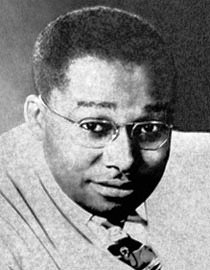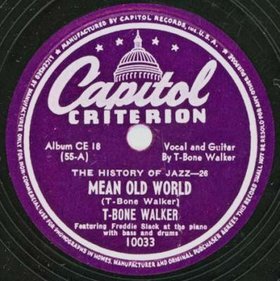Related Research Articles

The Brothers Johnson were an American funk and R&B band consisting of American musicians and brothers George and Louis E. Johnson. They achieved their greatest success from the mid-1970s to early 1980s, with three singles topping the R&B charts.

Aaron Thibeaux "T-Bone" Walker was an American blues guitarist, singer, songwriter and multi-instrumentalist, who was a pioneer and innovator of the jump blues and electric blues sound. In 2018 Rolling Stone magazine ranked him number 67 on its list of "The 100 Greatest Guitarists of All Time". In March of 1975, Walker died due to health issues in his Los Angeles home.

Alonzo "Lonnie" Johnson was an American blues and jazz singer, guitarist, violinist and songwriter. He was a pioneer of jazz guitar and jazz violin and is recognized as the first to play an electrically amplified violin.
The origins of rock and roll are complex. Rock and roll emerged as a defined musical style in the United States in the early to mid-1950s. It derived most directly from the rhythm and blues music of the 1940s, which itself developed from earlier blues, the beat-heavy jump blues, boogie woogie, up-tempo jazz and swing music. It was also influenced by gospel, country and western, and traditional folk music. Rock and roll in turn provided the main basis for the music that, since the mid-1960s, has been generally known simply as rock music.

Modern Records was an American record company and label formed in 1945 in Los Angeles by the Bihari brothers. Modern was one of the big R&B labels with artists including Etta James, Joe Houston, Little Richard, Ike & Tina Turner and John Lee Hooker. The label released some of the most influential blues and R&B records of the 1940s and 1950s.

Eddie Jones, better known as Guitar Slim, was a New Orleans blues guitarist in the 1940s and 1950s, best known for the million-selling song "The Things That I Used to Do", produced by Johnny Vincent for Specialty Records. It is listed in the Rock and Roll Hall of Fame's 500 Songs That Shaped Rock and Roll. Slim had a major impact on rock and roll and experimented with distorted overtones on the electric guitar a full decade before Jimi Hendrix.

Clide Vernon "Sonny" Landreth is an American blues musician from southwest Louisiana who is especially known as a slide guitar player. He was born in Canton, Mississippi, and settled in Lafayette, Louisiana. He lives in Breaux Bridge, Louisiana.

Joseph Christopher Liggins, Jr. was an American R&B, jazz and blues pianist and vocalist who led Joe Liggins and his Honeydrippers in the 1940s and 1950s. His band appeared often on the Billboard magazine charts. The band's biggest hit was "The Honeydripper", released in 1945. Joe Liggins was the older brother of R&B performer Jimmy Liggins.
Connie Curtis Crayton, known as Pee Wee Crayton, was an American R&B and blues guitarist and singer.

"Call It Stormy Monday " is a song written and recorded by American blues electric guitar pioneer T-Bone Walker. It is a slow twelve-bar blues performed in the West Coast blues-style that features Walker's smooth, plaintive vocal and distinctive guitar work. As well as becoming a record chart hit in 1948, it inspired B.B. King and others to take up the electric guitar. "Stormy Monday" became Walker's best-known and most-recorded song.
"Ain't Nobody's Business" is a 1920s blues song that became one of the first blues standards. It was published in 1922 by Porter Grainger and Everett Robbins. The song features a lyrical theme of freedom of choice and a vaudeville jazz–style musical arrangement. It was first recorded, as "'Tain't Nobody's Biz-ness if I Do", in 1922 by Anna Meyers, backed by the Original Memphis Five.

"Rock Me Baby" is a blues standard that has become one of the most recorded blues songs of all time. It originated as "Rockin' and Rollin'", a 1951 song by Lil' Son Jackson, itself inspired by earlier blues. Renditions by Muddy Waters and B.B. King made the song well-known. When B.B. King's recording of "Rock Me Baby" was released in 1964, it became his first single to reach the Top 40 in Billboard magazine's Hot 100 chart.
"Space Race" is an instrumental track by Billy Preston, released as a single in 1973 on the A&M label, taken from Preston's 1973 album Everybody Likes Some Kind of Music. "Space Race" was a gold record.

"3 O'Clock Blues" or "Three O'Clock Blues" is a slow twelve-bar blues recorded by Lowell Fulson in 1946. When it was released in 1948, it became Fulson's first hit. When B.B. King recorded the song in 1951, it became his first hit as well as one of the best-selling R&B singles in 1952.

"Mean Old World" is a blues song recorded by American blues electric guitar musician T-Bone Walker in 1942. It has been described as "the first important blues recordings on the electric guitar". Over the years it has been interpreted and recorded by numerous blues, jazz and rock and roll artists.

"Bon Ton Roula" is a zydeco-influenced blues song first recorded by Clarence Garlow in 1949. The following year, it became a hit, reaching number seven in Billboard magazine's Rhythm & Blues chart and introduced the style to a national audience.

His Best is a greatest hits album by Chicago blues harmonica player Little Walter, released on June 17, 1997 by MCA and Chess Records as a part of The Chess 50th Anniversary Collection. The album is seen as the CD successor to the 1958 The Best of Little Walter and features ten of the songs from that album.

"You Don't Love Me" is a rhythm and blues-influenced blues song recorded by American musician Willie Cobbs in 1960. Adapted from Bo Diddley's 1955 song "She's Fine She's Mine", it is Cobbs' best-known song and features a guitar figure and melody that has appealed to musicians in several genres.

Clarence Garlow was an American R&B, jump blues, Texas blues and cajun guitarist, singer and songwriter. He is best known for his recording of the song "Bon Ton Roula", which was a hit single on the U.S. Billboard R&B chart in 1950. One commentator called it "a rhythm and blues laced-zydeco song that helped introduce the Louisiana music form to a national audience."

"Moanin' at Midnight" is a blues song written and recorded by Howlin' Wolf in 1951. The recording was released on Chess Records as his debut single. It charted on Billboard's R&B chart, but the B-side, "How Many More Years," became the popular side of the record.
References
- ↑ "Best-Selling Retail Race Records" (PDF). Billboard . Vol. 60 no. 45. November 6, 1948. p. 31. ISSN 0006-2510.
Weeks to date: 3 (as of 11/6/48)
- ↑ Whitburn, Joel (1988). Top R&B Singles 1942–1988. Menomonee Falls, Wisconsin: Record Research. p. 103. ISBN 0-89820-068-7.
- 1 2 Dance, Helen Oakley (1987). Stormy Monday: The T-Bone Walker Story. Baton Rouge, Louisiana: Louisiana State University Press. p. 84. ISBN 0-8071-1355-7.
- 1 2 Vera, Billy (1992). Blues Masters, Volume 1, Urban Blues (Album notes). Various artists. Santa Monica, California: Rhino Records. p. 4. OCLC 27826371. R2 71121.